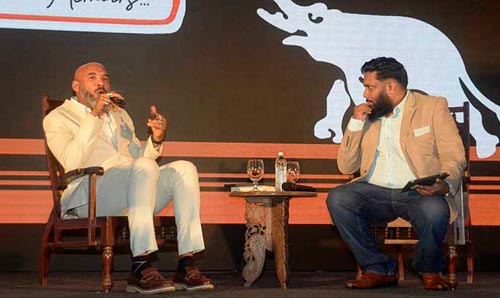Finding common ground between Sri Lankan English writing and Trinidad’s literature

Dr. Anthony Joseph in conversation with Dr. Sean Amarasekera at the Gratiaen. Pic by Eshan Fernando
Dr. Anthony Joseph, with rastacap and fingers studded heavily with rings, is a true son of the Caribbean. Though he has lived for over 35 years in the UK, he calls himself a Trinidadian with origins in Africa but also of Amerindian blood (a ‘quarter of my DNA’ he says, is from tribes like the Caribs and the Arawaks).
The poet, novelist and musician, a lecturer in English at the King’s College London was here in Colombo as chair of the jury for the 31st Gratiaen Prize.
For Anthony, there is much common ground between Sri Lankan English writing and Trinidad’s literature which long ago came of age and is an exotic presence in world literature.
A lot of the creative writing in both lands is visual describing the colours, the landscapes, and also the sea, an important element for islanders. The other senses too create vibrancy: tastes, smells and touch.
Migration was another common theme with tension between home and ‘another place’ often rippling on the surface – the dilemma whether to ‘leave or stay’.
Very pivotal also is the present moment. While British writing is rich, harking back to Chaucer and Beowulf – Sri Lankan English writing and Trinidadian literature cannot have the same conversation with other books so instead of being reflective they explore the present moment.
Also, while western writing is about the individual our writings concentrate on the community, says Anthony.
Before visiting the country, Anthony had gleaned from the Gratiaen entries that the island is yet trying to shake off ‘the remnants of being a colony’. Here the two countries differ because the Caribbean has its rich Creole while Sri Lankan English has not really made its impact on our literature, not a single Gratiaen entry breaking away from standard English.
Anthony was initially a musician and it was the cadences of Trinidadian music that instilled in him a love for ‘spoken music’. While at school he studied the English poets from Shakespeare to Keats and Yeats, he also imbibed the music of Mighty Sparrow and Lord Kitchener.
Anthony believes that the extraordinary success of Trinidadian writers lies in that they were all travellers having left the Caribbean to go to the UK or America. “You can only become a Caribbean person when you leave the Caribbean,” he says, pointing out how writers like V. S. Naipaul, C. L. R. James, Earl Lovelace and currently Monique Roffey all obtained an objective view of the Caribbean with a British education or experience.
“Those early Caribbean writers early on in the early 20th century had an understanding or were trying to understand what it meant to be a Caribbean person and defining it – I think that’s why people like V. S. Naipaul have been so successful, because they were able to define this really successful original identity – which was a Caribbean identity.”
“Just like children of mixed parents are always more beautiful than the parents the mixture of cultures, the English attention to grammar, detail, and communication combined with a Caribbean experience – weather, food, culture, people, those two things combined in people like Naipaul, James, Lovelace and Roffey – produced something special.”
Searching for an ideal partner? Find your soul mate on Hitad.lk, Sri Lanka's favourite marriage proposals page. With Hitad.lk matrimonial advertisements you have access to thousands of ads from potential suitors who are looking for someone just like you.


